Moderation in the pursuit of justice
英语演讲-死刑因不应该废除
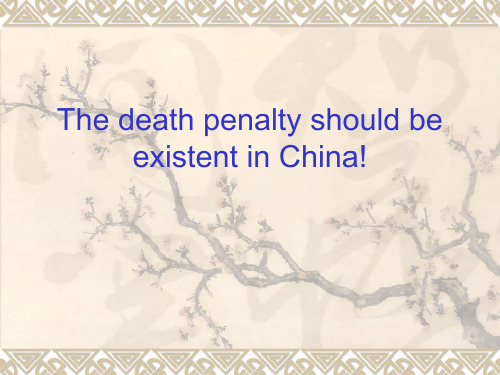
2)、Determined by the development of the death penalty culture of China.
❖ A long history of the death penalty
❖ The dynastic rules, the Republic era and the PRC era
1、The reasons for the death penalty to be exisopment ❖ Human rights ❖ National and social security ❖ Necessary and reasonable
❖ Justify capital punishment on the grounds of retribution, deterrence
❖ “a life for a life” “killing one to warn a hundred” “killing a chicken to warn a monkey”
❖ Christianity Seeing punishment as a form of revenge and as contrary to Christ’s message of forgiveness.
4)、The death penalty has the greatest deterrence.
1)、The abolition of the death penalty is not adapt to the national conditions of China.
❖ Low level of civilization
公平之歌唱正义的英语作文

Justice is a fundamental concept in human society,embodying the principles of fairness,equality,and righteousness.It is the cornerstone of social order and the safeguard of peoples rights and interests.The song of justice is a melody that resonates with the pursuit of a just society.The essence of justice is to ensure that every individual is treated fairly and that their rights are protected.It demands that laws are applied equally to all,without bias or discrimination.In a just society,the rule of law prevails,and people are judged based on their actions and merits,not their social status or wealth.The song of justice is also about the pursuit of truth and the exposure of falsehoods.It is the collective voice of the people demanding transparency and accountability from those in power.It is the call for the protection of the vulnerable and the marginalized,ensuring that their voices are heard and their needs are met.In the realm of education,justice is reflected in equal opportunities for learning and development.It means that every child,regardless of their background,has access to quality education and the chance to fulfill their potential.In the workplace,justice is about fair wages,safe working conditions,and the right to organize and collectively bargain.It is about recognizing the value of each workers contribution and ensuring that they are treated with respect and dignity.In the political sphere,justice is about the right to vote and participate in the democratic process.It is about the freedom of speech and the right to express ones opinions without fear of retribution.The song of justice is not just a call for individual rights but also a call for collective responsibility.It is about recognizing that we are all part of a larger community and that our actions have consequences for others.It is about striving for a society where everyone can live in harmony and contribute to the common good.However,the song of justice is not always a harmonious one.It is often met with resistance from those who benefit from the status quo and who seek to maintain their power and privilege.This resistance can take many forms,from subtle discrimination to overt oppression.But the song of justice is also a song of hope and perseverance.It is the anthem of those who believe in a better world and who are willing to fight for it.It is the melody that inspires people to stand up against injustice and to work towards a society that is fair,equitable,and just.In conclusion,the song of justice is a powerful and enduring melody that speaks to the human spirits yearning for fairness and righteousness.It is a call to action for all of us to contribute to the creation of a just society,where every individuals rights are respected, and their potential is realized.Let us all join in singing this song,and let our voices be heard in the pursuit of justice.。
富兰克林十三条戒律(中英对照)
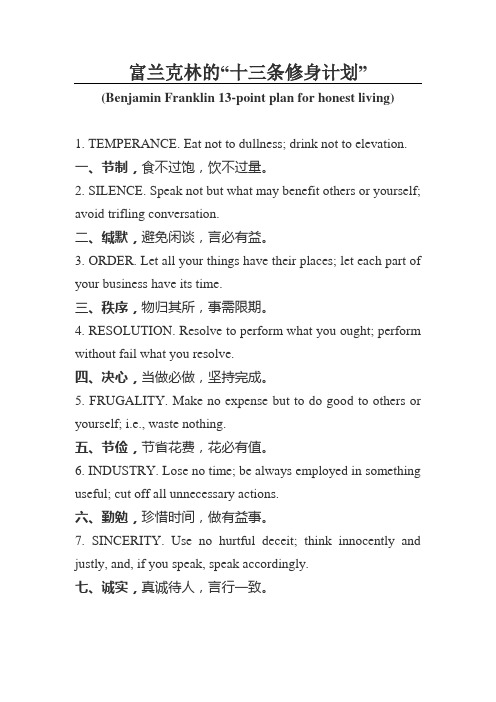
富兰克林的“十三条修身计划”(Benjamin Franklin 13-point plan for honest living)1. TEMPERANCE. Eat not to dullness; drink not to elevation.一、节制,食不过饱,饮不过量。
2. SILENCE. Speak not but what may benefit others or yourself; avoid trifling conversation.二、缄默,避免闲谈,言必有益。
3. ORDER. Let all your things have their places; let each part of your business have its time.三、秩序,物归其所,事需限期。
4. RESOLUTION. Resolve to perform what you ought; perform without fail what you resolve.四、决心,当做必做,坚持完成。
5. FRUGALITY. Make no expense but to do good to others or yourself; i.e., waste nothing.五、节俭,节省花费,花必有值。
6. INDUSTRY. Lose no time; be always employed in something useful; cut off all unnecessary actions.六、勤勉,珍惜时间,做有益事。
7. SINCERITY. Use no hurtful deceit; think innocently and justly, and, if you speak, speak accordingly.七、诚实,真诚待人,言行一致。
8. JUSTICE. Wrong none by doing injuries, or omitting the benefits that are your duty.八、正直,多行善事,不损他人。
修辞手段 rhetorical devices
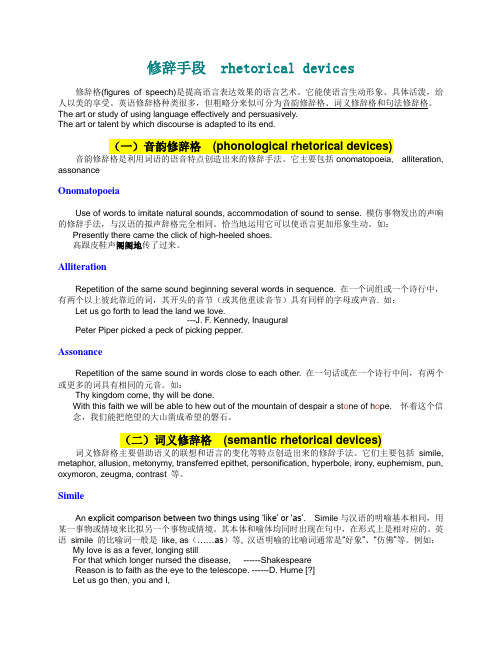
修辞手段 rhetorical devices修辞格(figures of speech)是提高语言表达效果的语言艺术。
它能使语言生动形象、具体活泼,给人以美的享受。
英语修辞格种类很多,但粗略分来似可分为音韵修辞格、词义修辞格和句法修辞格。
The art or study of using language effectively and persuasively.The art or talent by which discourse is adapted to its end.(一)音韵修辞格(phonological rhetorical devices) 音韵修辞格是利用词语的语音特点创造出来的修辞手法。
它主要包括onomatopoeia, alliteration, assonanceOnomatopoeiaUse of words to imitate natural sounds, accommodation of sound to sense. 模仿事物发出的声响的修辞手法,与汉语的拟声辞格完全相同。
恰当地运用它可以使语言更加形象生动。
如:Presently there came the click of high-heeled shoes.高跟皮鞋声阁阁地传了过来。
AlliterationRepetition of the same sound beginning several words in sequence. 在一个词组或一个诗行中,有两个以上彼此靠近的词,其开头的音节(或其他重读音节)具有同样的字母或声音. 如:Let us go forth to lead the land we love.---J. F. Kennedy, InauguralPeter Piper picked a peck of picking pepper.AssonanceRepetition of the same sound in words close to each other. 在一句话或在一个诗行中间,有两个或更多的词具有相同的元音。
公正护卫和平的英语作文

Justice is the cornerstone of society,and it plays a vital role in maintaining peace.In an essay on justice and peace,one might explore the following points:1.Definition of Justice:Begin by defining what justice means in the context of society. Justice can be seen as the principle of fairness and equity in the treatment of people, ensuring that everyone receives what they are due.2.Importance of Justice:Discuss why justice is important for a peaceful society.It helps to prevent conflicts by ensuring that all individuals are treated fairly and that their rights are respected.3.Historical Examples:Provide examples from history where the lack of justice has led to unrest and conflict,and where the establishment of justice has brought about peace and stability.4.Legal Systems:Talk about the role of legal systems in upholding justice.Explain how laws are created to reflect societal values and how they are enforced to maintain order and peace.5.Access to Justice:Discuss the concept of access to justice,which is the ability of people to seek redress for grievances through formal institutions.Highlight the importance of making justice accessible to all,regardless of their social or economic status.6.Challenges to Justice:Address the challenges that can impede the pursuit of justice, such as corruption,discrimination,and the lack of resources for legal aid.7.Role of Individuals:Emphasize the role that individuals play in promoting justice.This includes being aware of ones rights,standing up against injustice,and participating in the democratic process to shape laws and policies.8.International Justice:Extend the discussion to the international level,where justice is maintained through international law and organizations like the United Nations,which work to resolve conflicts and promote peace.9.Future of Justice:Conclude with thoughts on the future of justice and how technological advancements,such as AI in legal systems,might impact the way justice is administered and perceived.10.Call to Action:End the essay with a call to action,encouraging readers to contributeto a more just society by being informed,engaged,and advocating for the rights of others. Remember to use clear and persuasive language to convey the message that justice is not only a moral imperative but also a practical necessity for a peaceful and harmonious world.。
英语常见修辞手法
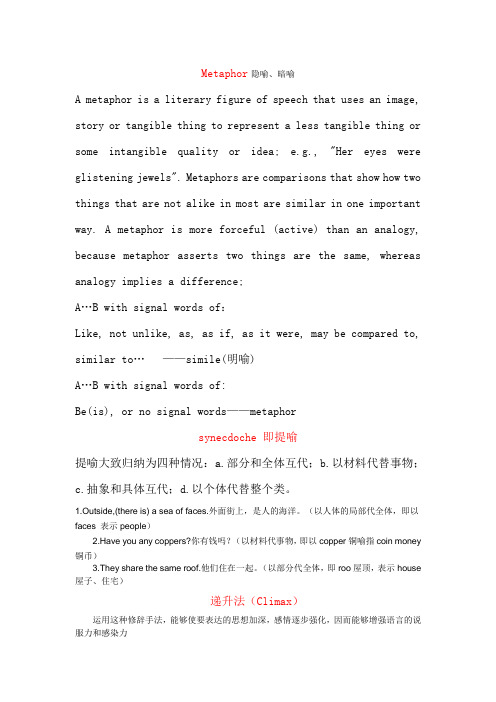
Metaphor隐喻、暗喻A metaphor is a literary figure of speech that uses an image, story or tangible thing to represent a less tangible thing or some intangible quality or idea; e.g., "Her eyes were glistening jewels". Metaphors are comparisons that show how two things that are not alike in most are similar in one important way. A metaphor is more forceful (active) than an analogy, because metaphor asserts two things are the same, whereas analogy implies a difference;A…B with signal words of:Like, not unlike, as, as if, as it were, may be compared to, similar to…——simile(明喻)A…B with signal words of:Be(is), or no signal words——metaphorsynecdoche 即提喻提喻大致归纳为四种情况:a.部分和全体互代;b.以材料代替事物;c.抽象和具体互代;d.以个体代替整个类。
1.Outside,(there is) a sea of faces.外面街上,是人的海洋。
(以人体的局部代全体,即以faces 表示people)2.Have you any coppers?你有钱吗?(以材料代事物,即以copper铜喻指coin money铜币)3.They share the same roof.他们住在一起。
在我心目中的英雄英语作文

In my heart,a hero is not defined by their physical strength or the size of their achievements,but by the strength of their character and the impact they have on the world around them.Here is an essay that captures the essence of a hero in my eyes.Title:The Hero in My HeartIntroduction:The concept of a hero has evolved over time,from the mighty warriors of ancient myths to the everyday individuals who make a difference in our lives.In my heart,a hero is someone who embodies courage,compassion,and a relentless pursuit of justice.Body Paragraph1:CourageCourage is the first trait that comes to mind when I think of a hero.It is the ability to face adversity without fear,to stand up for what is right even when it is unpopular.My hero is someone who dares to confront their fears,who takes a stand when others would rather turn a blind eye.Body Paragraph2:CompassionCompassion is the heart of a hero.It is the empathy that drives one to help those in need, to understand the struggles of others,and to offer a helping hand without expecting anything in return.My hero is compassionate,always putting the needs of others before their own,and showing kindness even in the face of hostility.Body Paragraph3:Relentless Pursuit of JusticeJustice is the guiding principle of my hero.It is the unwavering commitment to fairness and equality,the pursuit of truth,and the fight against injustice.My hero is relentless in their quest for justice,never backing down from a challenge,and always striving to create a better world for everyone.Body Paragraph4:Impact on SocietyA true hero leaves a lasting impact on society.They inspire others to be better,to strive for greatness,and to make a positive difference in the world.My heros actions resonate beyond their immediate circle,influencing people to think critically,to act with integrity, and to contribute to the greater good.Conclusion:In conclusion,the hero in my heart is not a figure of grandeur or a celebrity with fame. Instead,they are an ordinary person who has achieved extraordinary things through their courage,compassion,and pursuit of justice.They are a beacon of hope,a role model for us all,and a testament to the power of the human spirit to overcome adversity and makethe world a better place.Reflection:As I reflect on the qualities of my hero,I am reminded that heroism is not exclusive to those with extraordinary abilities or resources.It is within each of us to be a hero in our own way,to make a difference in the lives of others,and to leave a positive impact on the world around us.。
公平守正义的英语作文
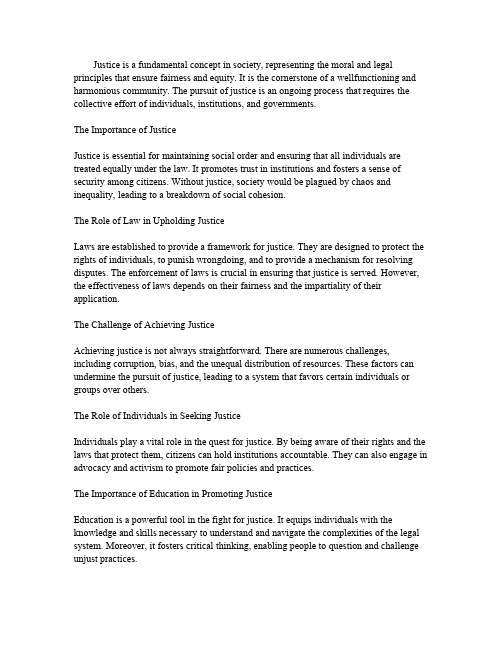
Justice is a fundamental concept in society,representing the moral and legal principles that ensure fairness and equity.It is the cornerstone of a wellfunctioning and harmonious community.The pursuit of justice is an ongoing process that requires the collective effort of individuals,institutions,and governments.The Importance of JusticeJustice is essential for maintaining social order and ensuring that all individuals are treated equally under the law.It promotes trust in institutions and fosters a sense of security among citizens.Without justice,society would be plagued by chaos and inequality,leading to a breakdown of social cohesion.The Role of Law in Upholding JusticeLaws are established to provide a framework for justice.They are designed to protect the rights of individuals,to punish wrongdoing,and to provide a mechanism for resolving disputes.The enforcement of laws is crucial in ensuring that justice is served.However, the effectiveness of laws depends on their fairness and the impartiality of their application.The Challenge of Achieving JusticeAchieving justice is not always straightforward.There are numerous challenges, including corruption,bias,and the unequal distribution of resources.These factors can undermine the pursuit of justice,leading to a system that favors certain individuals or groups over others.The Role of Individuals in Seeking JusticeIndividuals play a vital role in the quest for justice.By being aware of their rights and the laws that protect them,citizens can hold institutions accountable.They can also engage in advocacy and activism to promote fair policies and practices.The Importance of Education in Promoting JusticeEducation is a powerful tool in the fight for justice.It equips individuals with the knowledge and skills necessary to understand and navigate the complexities of the legal system.Moreover,it fosters critical thinking,enabling people to question and challenge unjust practices.The Role of Technology in Enhancing JusticeIn the modern world,technology plays an increasingly significant role in the pursuit of justice.It can provide greater transparency in legal processes,facilitate access to legal resources,and enable the monitoring of judicial decisions to ensure fairness.The Global Perspective on JusticeJustice is not confined to national boundaries.International law and human rights conventions have been established to promote justice on a global scale.These instruments aim to protect the rights of individuals and to hold states accountable for their actions.ConclusionThe pursuit of justice is an ongoing endeavor that requires vigilance,commitment,and the active participation of all members of society.It is a multifaceted challenge that involves legal,social,and political dimensions.By working together,we can strive to create a world where justice is not just an ideal but a reality for all.。
英语修辞方法
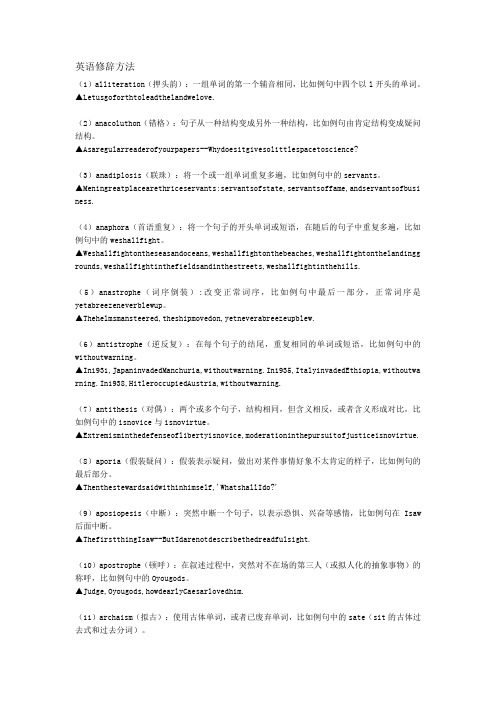
英语修辞方法(1)alliteration(押头韵):一组单词的第一个辅音相同,比如例句中四个以l开头的单词。
▲Letusgoforthtoleadthelandwelove.(2)anacoluthon(错格):句子从一种结构变成另外一种结构,比如例句由肯定结构变成疑问结构。
▲Asaregularreaderofyourpapers--Whydoesitgivesolittlespacetoscience?(3)anadiplosis(联珠):将一个或一组单词重复多遍,比如例句中的servants。
▲Meningreatplacearethriceservants:servantsofstate,servantsoffame,andservantsofbusi ness.(4)anaphora(首语重复):将一个句子的开头单词或短语,在随后的句子中重复多遍,比如例句中的weshallfight。
▲Weshallfightontheseasandoceans,weshallfightonthebeaches,weshallfightonthelandingg rounds,weshallfightinthefieldsandinthestreets,weshallfightinthehills.(5)anastrophe(词序倒装):改变正常词序,比如例句中最后一部分,正常词序是yetabreezeneverblewup。
▲Thehelmsmansteered,theshipmovedon,yetneverabreezeupblew.(6)antistrophe(逆反复):在每个句子的结尾,重复相同的单词或短语,比如例句中的withoutwarning。
▲In1931,Japani nvadedManchuria,withoutwarning.In1935,ItalyinvadedEthiopia,withoutwa rning.In1938,HitleroccupiedAustria,withoutwarning.(7)antithesis(对偶):两个或多个句子,结构相同,但含义相反,或者含义形成对比,比如例句中的isnovice与isnovirtue。
正义守护公平的英语作文
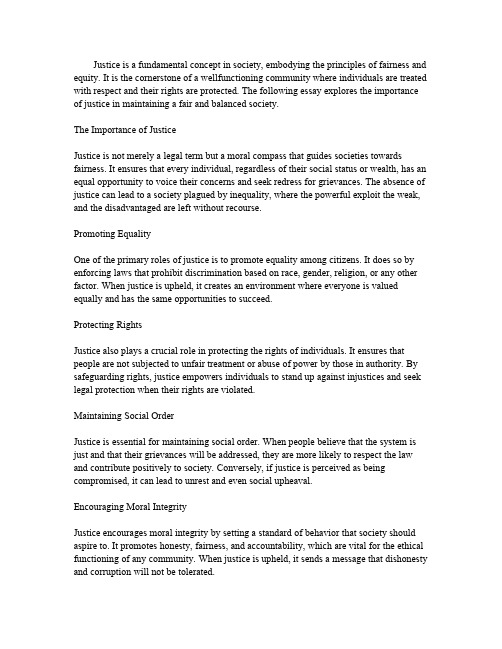
Justice is a fundamental concept in society,embodying the principles of fairness and equity.It is the cornerstone of a wellfunctioning community where individuals are treated with respect and their rights are protected.The following essay explores the importance of justice in maintaining a fair and balanced society.The Importance of JusticeJustice is not merely a legal term but a moral compass that guides societies towards fairness.It ensures that every individual,regardless of their social status or wealth,has an equal opportunity to voice their concerns and seek redress for grievances.The absence of justice can lead to a society plagued by inequality,where the powerful exploit the weak, and the disadvantaged are left without recourse.Promoting EqualityOne of the primary roles of justice is to promote equality among citizens.It does so by enforcing laws that prohibit discrimination based on race,gender,religion,or any other factor.When justice is upheld,it creates an environment where everyone is valued equally and has the same opportunities to succeed.Protecting RightsJustice also plays a crucial role in protecting the rights of individuals.It ensures that people are not subjected to unfair treatment or abuse of power by those in authority.By safeguarding rights,justice empowers individuals to stand up against injustices and seek legal protection when their rights are violated.Maintaining Social OrderJustice is essential for maintaining social order.When people believe that the system is just and that their grievances will be addressed,they are more likely to respect the law and contribute positively to society.Conversely,if justice is perceived as being compromised,it can lead to unrest and even social upheaval.Encouraging Moral IntegrityJustice encourages moral integrity by setting a standard of behavior that society should aspire to.It promotes honesty,fairness,and accountability,which are vital for the ethical functioning of any community.When justice is upheld,it sends a message that dishonesty and corruption will not be tolerated.Challenges to JusticeDespite its importance,justice faces numerous challenges.Corruption,bias,and the influence of wealth and power can undermine the fairness of the judicial system.To overcome these challenges,societies must continually strive to improve their legal frameworks,ensure transparency in judicial processes,and educate citizens about their rights and responsibilities.ConclusionIn conclusion,justice is the bedrock of a fair society.It is the force that levels the playing field,protects the vulnerable,and upholds the values of equality and integrity.By recognizing and addressing the challenges to justice,societies can work towards a future where fairness is not just an ideal but a reality for all.。
Figures of Speech
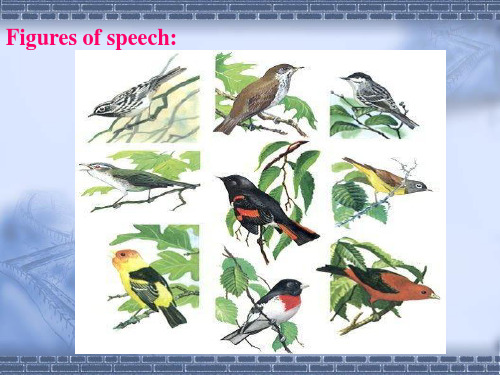
12). Onomatopoeia
The formation or use of words such as buzz or murmur that imitate the sounds associated with the objects or actions they refer to. e.g: He banged the door noisily. The little boy scratched the limousine with a knife.
6) Hyperbole
(exaggeration, overstatement) <-->(Understatement) In overstatement the diction exaggerates the subject, and in understatement the words play down the magnitude or value of the subject. Overstatement is also called hyperbole. e.g.: She is dying to know what job has been assigned her.
Figures of speech:
Simile:
an explicit comparison between two things using 'like' or 'as'. Subject or (tenor); reference (vehicle); simile marker (indicator) Indicator: like, as, as if, as though, as…as, as…so, similar to, to bear resemblance to. e.g: The old man's hair is as white as snow. My luve (love) is like a red, red rose. (R. Burns)
成功人士的英文演讲稿(精选13篇)
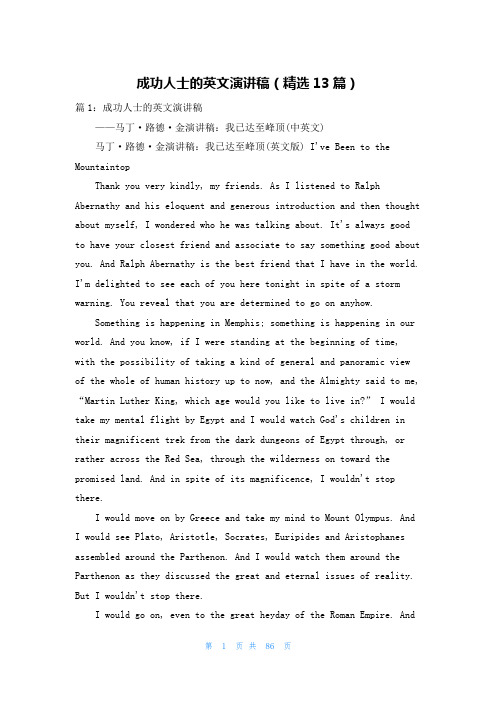
成功人士的英文演讲稿(精选13篇)篇1:成功人士的英文演讲稿——马丁·路德·金演讲稿:我已达至峰顶(中英文)马丁·路德·金演讲稿:我已达至峰顶(英文版) I've Been to the MountaintopThank you very kindly, my friends. As I listened to Ralph Abernathy and his eloquent and generous introduction and then thought about myself, I wondered who he was talking about. It's always good to have your closest friend and associate to say something good about you. And Ralph Abernathy is the best friend that I have in the world. I'm delighted to see each of you here tonight in spite of a storm warning. You reveal that you are determined to go on anyhow.Something is happening in Memphis; something is happening in our world. And you know, if I were standing at the beginning of time, with the possibility of taking a kind of general and panoramic view of the whole of human history up to now, and the Almighty said to me, “Martin Luther King, which age would you like to live in?” I would take my mental flight by Egypt and I would watch God's children in their magnificent trek from the dark dungeons of Egypt through, or rather across the Red Sea, through the wilderness on toward the promised land. And in spite of its magnificence, I wouldn't stop there.I would move on by Greece and take my mind to Mount Olympus. And I would see Plato, Aristotle, Socrates, Euripides and Aristophanes assembled around the Parthenon. And I would watch them around the Parthenon as they discussed the great and eternal issues of reality. But I wouldn't stop there.I would go on, even to the great heyday of the Roman Empire. AndI would see developments around there, through various emperors and leaders. But I wouldn't stop there.I would even come up to the day of the Renaissance, and get a quick picture of all that the Renaissance did for the cultural and aesthetic life of man. But I wouldn't stop there.I would even go by the way that the man for whom I am named had his habitat. And I would watch Martin Luther as he tacked his ninety-five theses on the door at the church of Wittenberg. But I wouldn't stop there.I would come on up even to 1863, and watch a vacillating President by the name of Abraham Lincoln finally come to the conclusion that he had to sign the Emancipation Proclamation. But I wouldn't stop there.I would even come up to the early thirties, and see a man grappling with the problems of the bankruptcy of his nation. And come with a n eloquent cry that we have nothing to fear but “fearitself.” But I wouldn't stop there.Strangely enough, I would turn to the Almighty, and say, “If you allow me to live just a few years in the second half of the 20th century, I will be happy.”Now that's a strange statement to make, because the world is all messed up. The nation is sick. Trouble is in the land; confusion all around. That's a strange statement. But I know, somehow, that only when it is dark enough can you see the stars. And I see God working in this period of the twentieth century in a way that men, in some strange way, are responding.Something is happening in our world. The masses of people are rising up. And wherever they are assembled today, whether they are inJohannesburg, South Africa; Nairobi, Kenya; Accra, Ghana; New York City; Atlanta, Georgia; Jackson, Mississippi; or Memphis, Tennessee -- the cry is always the same: “We want to be free.”And another reason that I'm happy to live in this period is that we have been forced to a point where we are going to have to grapple with the problems that men have been trying to grapple with through history, but the demands didn't force them to do it. Survival demands that we grapple with them. Men, for years now, have been talking about war and peace. But now, no longer can they just talk about it. It is no longer a choice between violence and nonviolence in this world; it's nonviolence or nonexistence. That is where we are today. And also in the human rights revolution, if something isn't done, and done in a hurry, to bring the colored peoples of the world out of their long years of poverty, their long years of hurt and neglect, the whole world is doomed. Now, I'm just happy that God has allowed me to live in this period to see what is unfolding. And I'm happythat He's allowed me to be in Memphis.I can remember -- I can remember when Negroes were just going around as Ralph has said, so often, scratching where they didn't itch, and laughing when they were not tickled. But that day is all over. We mean business now, and we are determined to gain ourrightful place in God's world.And that's all this whole thing is about. We aren't engaged in any negative protest and in any negative arguments with anybody. We are saying that we are determined to be men. We are determined to be people. We are saying -- We are saying that we are God's children. And that we are God's children, we don't have to live like we are forced to live.Now, what does all of this mean in this great period of history? It means that we've got to stay together. We've got to stay together and maintain unity. You know, whenever Pharaoh wanted to prolong the period of slavery in Egypt, he had a favorite, favorite formula for doing it. What was that? He kept the slaves fighting among themselves. But whenever the slaves get together, something happens in Pharaoh's court, and he cannot hold the slaves in slavery. When the slaves get together, that's the beginning of getting out of slavery. Now let us maintain unity.Secondly, let us keep the issues where they are. The issue is injustice. The issue is the refusal of Memphis to be fair and honest in its dealings with its public servants, who happen to be sanitation workers. Now, we've got to keep attention on that. That's always the problem with a little violence. You know what happened the other day, and the press dealt only with the window-breaking. I read the articles. They very seldom got around to mentioning the fact that one thousand, three hundred sanitation workers are on strike, and that Memphis is not being fair to them, and that Mayor Loeb is in dire need of a doctor. They didn't get around to that.Now we're going to march again, and we've got to march again, in order to put the issue where it is supposed to be -- and force everybody to see that there are thirteen hundred of God's children here suffering, sometimes going hungry, going through dark and dreary nights wondering how this thing is going to come out. That's the issue. And we've got to say to the nation: We know how it's coming out. For when people get caught up with that which is right and they are willing to sacrifice for it, there is no stopping point short of victory.We aren't going to let any mace stop us. We are masters in our nonviolent movement in disarming police forces; they don't know what to do. I've seen them so often. I remember in Birmingham, Alabama, when we were in that majestic struggle there, we would move out of the 16th Street Baptist Church day after day; by the hundreds we would move out. And Bull Connor would tell them to send the dogs forth, and they did come; but we just went before the dogs singing, “Ain't gonna let nobody turn me around.”Bull Connor next would say, “Turn the fire hoses on.” And as I said to you the other night, Bull Connor didn't know history. He knew a kind of physics that somehow didn't relate to the transphysics that we knew about. And that was the fact that there was a certain kind of fire that no water could put out. And we went before the fire hoses; we had known water. If we were Baptist or some other denominations, we had been immersed. If we were Methodist, and some others, we had been sprinkled, but we knew water. That couldn't stop us.And we just went on before the dogs and we would look at them; and we'd go on before the water hoses and we would look at it, and we'd just go on singing “Over my head I see freedom in the air.” And then we would be thrown in the paddy wagons, and sometimes we were stacked in there like sardines in a can. And they would throw us in, and old Bull would say, “Take 'em off,” and they did; and we would just go in the paddy wagon singing, “We Shall Overcome.” And every now and then we'd get in jail, and we'd see the jailers looking through the windows being moved by our prayers, and being moved by our words and our songs. And there was a power there which Bull Connor couldn't adjust to; and so we ended up transforming Bull into a steer, and we won our struggle in Birmingham. Now we've got to goon in Memphis just like that. I call upon you to be with us when we go out Monday.Now about injunctions: We have an injunction and we're going into court tomorrow morning to fight this illegal, unconstitutional injunction. All we say to A merica is, “Be true to what you said on paper.” If I lived in China or even Russia, or any totalitarian country, maybe I could understand some of these illegal injunctions. Maybe I could understand the denial of certain basic First Amendment privileges, because they hadn't committed themselves to that over there. But somewhere I read of the freedom of assembly. Somewhere I read of the freedom of speech. Somewhere I read of the freedom of press. Somewhere I read that the greatness of America is the right to protest for right. And so just as I say, we aren't going to let dogs or water hoses turn us around, we aren't going to let any injunction turn us around. We are going on.We need all of you. And you know what's beautiful to me is to see all of these ministers of the Gospel. It's a marvelous picture. Whois it that is supposed to articulate the longings and aspirations of the people more than the preacher? Somehow the preacher must have a kind of fire shut up in his bones. And whenever injustice is around he tell it. Somehow the preacher must be an Amos, and saith, “When God speaks who can but prophesy?” Again with Amos, “Let justiceroll down like waters and righteousness like a mighty stream.” Somehow the preacher must say with Jesus, “The Spirit of th e Lord is upon me, because he hath anointed me,” and he's anointed me to deal with the problems of the poor.“And I want to commend the preachers, under the leadership of these noble men: James Lawson, one who has been in this struggle formany years; he's been to jail for struggling; he's been kicked out of Vanderbilt University for this struggle, but he's still going on, fighting for the rights of his people. Reverend Ralph Jackson, Billy Kiles; I could just go right on down the list, but time will not permit. But I want to thank all of them. And I want you to thank them, because so often, preachers aren't concerned about anything but themselves. And I'm always happy to see a relevant ministry.It's all right to talk about ”long white robes over yonder,“ in all of its symbolism. But ultimately people want some suits and dresses and shoes to wear down here! It's all right to talkabout ”streets flowing with milk and honey,“ but God has commanded us to be concerned about the slums down here, and his children who can't eat three square meals a day. It's all right to talk about the new Jerusalem, but one day, God's preacher must talk about the new New York, the new Atlanta, the new Philadelphia, the new Los Angeles, the new Memphis, Tennessee. This is what we have to do.Now the other thing we'll have to do is this: Always anchor our external direct action with the power of economic withdrawal. Now, we are poor people. Individually, we are poor when you compare us with white society in America. We are poor. Never stop and forget that collectively -- that means all of us together -- collectively we are richer than all the nations in the world, with the exception of nine. Did you ever think about that? After you leave the United States, Soviet Russia, Great Britain, West Germany, France, and I could name the others, the American Negro collectively is richer than most nations of the world. We have an annual income of more than thirty billion dollars a year, which is more than all of the exports of the United States, and more than the national budget of Canada. Did youknow that? That's power right there, if we know how to pool it.We don't have to argue with anybody. We don't have to curse and go around acting bad with our words. We don't need any bricks and bottles. We don't need any Molotov cocktails. We just need to go around to these stores, and to these massive industries in our country, and say, ”God sent us by here, to say to you that you're not treating his children right. And we've come by here to ask you to make the first item on your agenda fair treatment, where God's children are concerned. Now, if you are not prepared to do that, we do have an agenda that we must follow. And our agenda calls for withdrawing economic support from you.“And so, as a result of this, we are asking you tonight, to go out and tell your neighbors not to buy Coca-Cola in Memphis. Go by and tell them not to buy Sealtest milk. Tell them not to buy -- what is the other bread? -- Wonder Bread. And what is the other bread company, Jesse? Tell them not to buy Hart's bread. As Jesse Jackson has said, up to now, only the garbage men have been feeling pain; now we must kind of redistribute the pain. We are choosing these companies because they haven't been fair in their hiring policies; and we are choosing them because they can begin the process of saying they are going to support the needs and the rights of these men who are on strike. And then they can move on town -- downtown and tell Mayor Loeb to do what is right.But not only that, we've got to strengthen black institutions. I call upon you to take your money out of the banks downtown and deposit your money in Tri-State Bank. We want a ”bank-in“ movement in Memphis. Go by the savings and loan association. I'm not asking you something that we don't do ourselves at SCLC. Judge Hooks andothers will tell you that we have an account here in the savings and loan association from the Southern Christian Leadership Conference. We are telling you to follow what we are doing. Put your money there. You have six or seven black insurance companies here in the city of Memphis. Take out your insurance there. We want to havean ”insurance-in.“Now these are some practical things that we can do. We begin the process of building a greater economic base. And at the same time, we are putting pressure where it really hurts. I ask you to follow through here.Now, let me say as I move to my conclusion that we've got to give ourselves to this struggle until the end. Nothing would be moretragic than to stop at this point in Memphis. We've got to see it through. And when we have our march, you need to be there. If it means leaving work, if it means leaving school -- be there. Be concerned about your brother. You may not be on strike. But either we go up together, or we go down together.Let us develop a kind of dangerous unselfishness. One day a man came to Jesus, and he wanted to raise some questions about some vital matters of life. At points he wanted to trick Jesus, and show himthat he knew a little more than Jesus knew and throw him off base.... Now that question could have easily ended up in a philosophical and theological debate. But Jesus immediately pulled that question from mid-air, and placed it on a dangerous curve between Jerusalemand Jericho. And he talked about a certain man, who fell among thieves. You remember that a Levite and a priest passed by on the other side. They didn't stop to help him. And finally a man ofanother race came by. He got down from his beast, decided not to becompassionate by proxy. But he got down with him, administered first aid, and helped the man in need. Jesus ended up saying, this was the good man, this was the great man, because he had the capacity to project the ”I“ into the ”thou,“ and to be concerned about his brother.Now you know, we use our imagination a great deal to try to determine why the priest and the Levite didn't stop. At times we say they were busy going to a church meeting, an ecclesiastical gathering, and they had to get on down to Jerusalem so they wouldn't be late for their meeting. At other times we would speculate that there was a religious law that ”One who was engaged in religious ceremonials was not to touch a human body twenty-four hours beforeth e ceremony.“ And every now and then we begin to wonder whether maybe they were not going down to Jerusalem -- or down to Jericho, rather to organize a ”Jericho Road Improvement Association.“ That's a possibility. Maybe they felt that it was better to deal with the problem from the causal root, rather than to get bogged down with an individual effect.But I'm going to tell you what my imagination tells me. It's possible that those men were afraid. You see, the Jericho road is a dangerous road. I remember when Mrs. King and I were first in Jerusalem. We rented a car and drove from Jerusalem down to Jericho. And as soon as we got on that road, I said to my wife, ”I can see why Jesus used this as the setting for his parable.“ It's a winding, meandering road. It's really conducive for ambushing. You start outin Jerusalem, which is about 1200 miles -- or rather 1200 feet above sea level. And by the time you get down to Jericho, fifteen or twenty minutes later, you're about 2200 feet below sea level. That's adangerous road. In the days of Jesus it came to be known asthe ”Bloody Pass.“ And you know, it's possible that the priest and the Levite looked over that man on the ground and wondered if the robbers were still around. Or it's possible that they felt that the man on the ground was merely faking. And he was acting like he had been robbed and hurt, in order to seize them over there, lure them there for quick and easy seizure. And so the first question that the priest asked -- the first question that the Levi te asked was, ”If I stop to help this man, what will happen to me?“ But then the Good Samaritan came by. And he reversed the question: ”If I do not stop to help this man, what will happen to him?“That's the question before you tonight. Not, ”If I sto p to help the sanitation workers, what will happen to my job. Not, “If I stop to help the sanitation workers what will happen to all of the hours that I usually spend in my office every day and every week as a pastor?” The question is not, “If I stop to he lp this man in need, what will happen to me?” The question is, “If I do not stop to help the sanitation workers, what will happen to them?” That's the question.Let us rise up tonight with a greater readiness. Let us stand with a greater determination. And let us move on in these powerful days, these days of challenge to make America what it ought to be. We have an opportunity to make America a better nation. And I want to thank God, once more, for allowing me to be here with you.You know, several years ago, I was in New York City autographing the first book that I had written. And while sitting there autographing books, a demented black woman came up. The only question I heard from her was, “Are you Martin Luther King?” And I waslooking down wri ting, and I said, “Yes.” And the next minute I felt something beating on my chest. Before I knew it I had been stabbed by this demented woman. I was rushed to Harlem Hospital. It was a dark Saturday afternoon. And that blade had gone through, and the X-rays revealed that the tip of the blade was on the edge of my aorta, the main artery. And once that's punctured, your drowned in your own blood -- that's the end of you.It came out in the New York Times the next morning, that if I had merely sneezed, I would have died. Well, about four days later, they allowed me, after the operation, after my chest had been opened, and the blade had been taken out, to move around in the wheel chair in the hospital. They allowed me to read some of the mail that came in, and from all over the states and the world, kind letters came in. I read a few, but one of them I will never forget. I had received one from the President and the Vice-President. I've forgotten what those telegrams said. I'd received a visit and a letter from the Governor of New York, but I've forgotten what that letter said. But there was another letter that came from a little girl, a young girl who was a student at the White Plains High School. And I looked at that letter, and I'll never forget it. It said simply,Dear Dr. King,I am a ninth-grade student at the White Plains High School.“And she said,While it should not matter, I would like to mention that I'm a white girl. I read in the paper of your misfortune, and of your suffering. And I read that if you had sneezed, you would have died. And I'm simply writing you to say that I'm so happy that you didn't sneeze.And I want to say tonight -- I want to say tonight that I too am happy that I didn't sneeze. Because if I had sneezed, I wouldn't have been around here in 1960, when students all over the South started sitting-in at lunch counters. And I knew that as they were sitting in, they were really standing up for the best in the American dream, and taking the whole nation back to those great wells of democracy which were dug deep by the Founding Fathers in the Declaration of Independence and the Constitution.If I had sneezed, I wouldn't have been around here in 1961, when we decided to take a ride for freedom and ended segregation in inter-state travel.If I had sneezed, I wouldn't have been around here in 1962, when Negroes in Albany, Georgia, decided to straighten their backs up. And whenever men and women straighten their backs up, they are going somewhere, because a man can't ride your back unless it is bent.If I had sneezed -- If I had sneezed I wouldn't have been here in 1963, when the black people of Birmingham, Alabama, aroused the conscience of this nation, and brought into being the Civil Rights Bill.If I had sneezed, I wouldn't have had a chance later that year,in August, to try to tell America about a dream that I had had.If I had sneezed, I wouldn't have been down in Selma, Alabama, to see the great Movement there.If I had sneezed, I wouldn't have been in Memphis to see a community rally around those brothers and sisters who are suffering. I'm so happy that I didn't sneeze.And they were telling me --. Now, it doesn't matter, now. It really doesn't matter what happens now. I left Atlanta this morning,and as we got started on the plane, there were six of us. The pilot said over the public address system, ”We are sorry for the delay, but we have Dr. Martin Luther King on the plane. And to be sure that all of the bags were checked, and to be sure that nothing would be wrong with on the plane, we had to check out everything carefully. And we've had the plane protected and guarded all night.“And then I got into Memphis. And some began to say the threats, or talk about the threats that were out. What would happen to me from some of our sick white brothers?Well, I don't know what will happen now. We've got some difficult days ahead. But it really doesn't matter with me now, because I've been to the mountaintop.And I don't mind.Like anybody, I would like to live a long life. Longevity has its place. But I'm not concerned about that now. I just want to do God's will. And He's allowed me to go up to the mountain. And I've looked over. And I've seen the Promised Land. I may not get there with you. But I want you to know tonight, that we, as a people, will get to the promised land!mlkmountaintop3.JPGAnd so I'm happy, tonight.I'm not worried about anything.I'm not fearing any man!Mine eyes have seen the glory of the coming of the Lord!!马丁·路德·金演讲稿:我已达至峰顶(中文版部分翻译)但是我要告诉你们我的想象力给我的启示。
富兰克林13条美德中英文(课堂PPT)
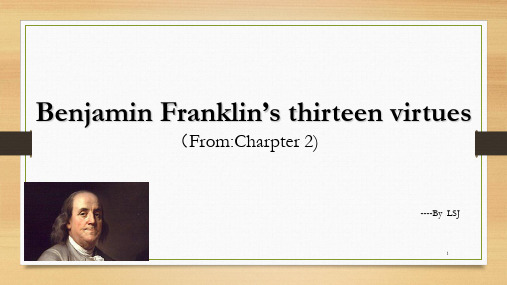
(From:Charpter 2)
----By LSJ
1
Benjamin Franklin’s thirteen virtues
Temperance Silence Order Resolution
Frugality
Industry Sincerity
9
Benjamin Franklin’s thirteen virtues
• 8、Justice:
• Justice:Wrong none, by doing injuri es or omitting the benefits that ar e your duty
10
Benjamin Franklin’s thirteen virtues
Cut off all unnecessary actions.
• 勤勉:珍惜光阴,做有用的事。(不要浪费时间。总应该有些有用的事来做。
取消一切不必要的活动)
8
Benjamin Franklin’s thirteen virtues
•7、Sincerity:
• Sincerity:Use no hur
•秩序:物归其所,事定期限(让东西各归其位。给自己的事务安排好时)
5
Hale Waihona Puke Benjamin Franklin’s thirteen virtues
• 4. Resolution
• Resolution: Resolve to perform what you ought. Perform without
•
。沉默:言必有益,避免闲聊(只说那些能让他人或自己受益的话。避免闲聊。)
英语修辞

丘吉尔二战著名演讲
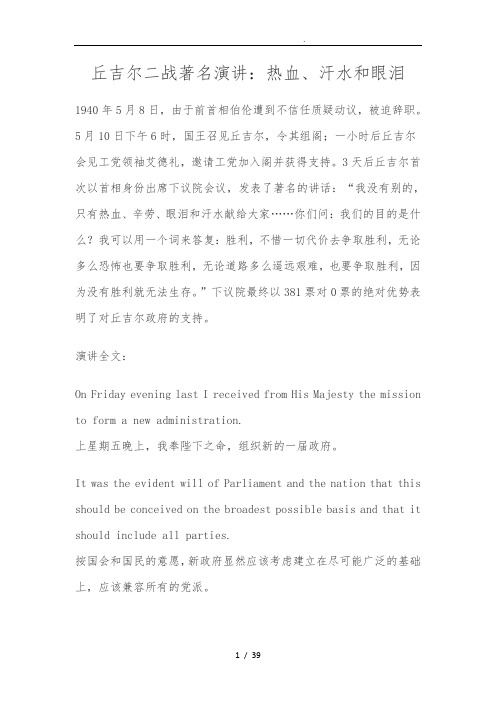
丘吉尔二战著名演讲:热血、汗水和眼泪1940年5月8日,由于前首相伯伦遭到不信任质疑动议,被迫辞职。
5月10日下午6时,国王召见丘吉尔,令其组阁;一小时后丘吉尔会见工党领袖艾德礼,邀请工党加入阁并获得支持。
3天后丘吉尔首次以首相身份出席下议院会议,发表了著名的讲话:“我没有别的,只有热血、辛劳、眼泪和汗水献给大家……你们问:我们的目的是什么?我可以用一个词来答复:胜利,不惜一切代价去争取胜利,无论多么恐怖也要争取胜利,无论道路多么遥远艰难,也要争取胜利,因为没有胜利就无法生存。
”下议院最终以381票对0票的绝对优势表明了对丘吉尔政府的支持。
演讲全文:On Friday evening last I received from His Majesty the mission to form a new administration.上星期五晚上,我奉陛下之命,组织新的一届政府。
It was the evident will of Parliament and the nation that this should be conceived on the broadest possible basis and that it should include all parties.按国会和国民的意愿,新政府显然应该考虑建立在尽可能广泛的基础上,应该兼容所有的党派。
I have already completed the most important part of this task.A war cabinet has been formed of five members, representing, with the Labor, Opposition and Liberals, the unity of the nation. 我已经完成了这项任务的最主要的部分。
战时阁已由五人组成,包括工党、反对党和自由党,这体现了举国团结一致。
天下大事顺之者昌逆之者亡的英语作文素材
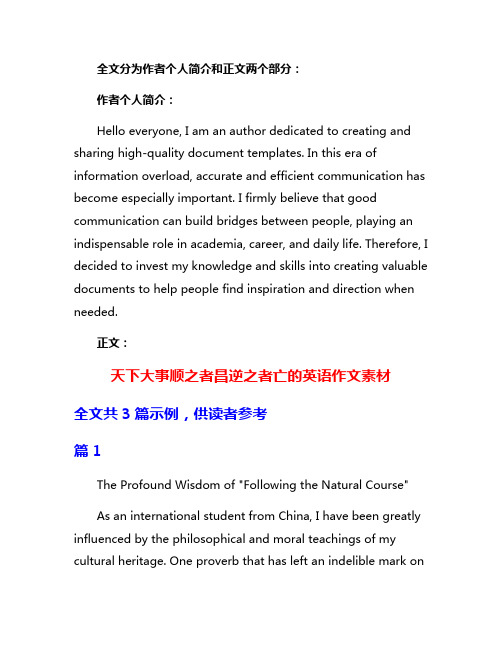
全文分为作者个人简介和正文两个部分:作者个人简介:Hello everyone, I am an author dedicated to creating and sharing high-quality document templates. In this era of information overload, accurate and efficient communication has become especially important. I firmly believe that good communication can build bridges between people, playing an indispensable role in academia, career, and daily life. Therefore, I decided to invest my knowledge and skills into creating valuable documents to help people find inspiration and direction when needed.正文:天下大事顺之者昌逆之者亡的英语作文素材全文共3篇示例,供读者参考篇1The Profound Wisdom of "Following the Natural Course"As an international student from China, I have been greatly influenced by the philosophical and moral teachings of my cultural heritage. One proverb that has left an indelible mark onmy worldview is the ancient saying, "Those who follow the natural course will prosper, while those who go against it will perish." This timeless wisdom, which can be traced back to the classical texts of Taoism and Confucianism, carries profoundly universal insights into the harmonious relationship between humanity and the natural order of the universe.At its core, this proverb emphasizes the importance of aligning one's actions and beliefs with the fundamental principles that govern the natural world. It suggests that true prosperity and fulfillment can only be attained by embracing and respecting the inherent rhythms, cycles, and balances that exist in nature, rather than attempting to forcefully impose our will upon it.This concept resonates deeply with me, as it echoes the ecological awareness and reverence for nature that has been instilled in me since childhood. Growing up in a rapidly modernizing China, I witnessed firsthand the consequences of unchecked industrialization and urbanization on the environment. The air pollution, water contamination, and deforestation that plagued many cities served as stark reminders of the perils of human overreach and disregard for the natural order.However, this proverb is not merely a cautionary tale against environmental degradation; it also carries profound implications for our personal and societal conduct. By extension, it advises us to live in harmony with the fundamental laws and ethical principles that govern human existence, such as compassion, justice, and moderation.In my studies of Chinese history and philosophy, I have come to appreciate the deep interconnectedness between the natural world and the moral fabric of society. The concept of "following the natural course" is intimately tied to the Confucian ideals of cultivating virtue, maintaining social harmony, and upholding the hierarchical order that ensures stability and balance.Conversely, those who "go against the natural course" are often associated with the pursuit of excess, greed, and the disruption of social and cosmic equilibrium. The consequences of such actions, as the proverb warns, are ultimately detrimental and lead to ruin.This proverb also resonates with the Taoist principles of effortless action, simplicity, and spontaneity. By embracing the natural flow of life and letting go of our ego-driven desires and expectations, we can achieve a state of inner peace and harmonythat allows us to navigate life's challenges with grace and wisdom.As I reflect on my own experiences as an international student navigating the complexities of cross-cultural adaptation, this proverb has served as a guiding light. Immersing myself in a foreign environment with its own unique customs, values, and societal norms, I have come to appreciate the importance of "following the natural course" in a metaphorical sense.Rather than stubbornly clinging to my preconceived notions and attempting to impose my cultural perspectives on others, I have learned to embrace the fluidity of cultural exchange. By adapting to the local customs and respecting the inherent rhythms of my host society, I have been able to more seamlessly integrate and find personal growth and fulfillment.Conversely, those who rigidly resist cultural immersion and insist on imposing their own values and beliefs upon others often find themselves isolated, misunderstood, and ultimately unfulfilled in their cross-cultural experiences.Beyond its philosophical and cultural implications, this proverb also carries practical wisdom for navigating the personal and professional challenges that we face in our daily lives. Whether it is pursuing our academic goals, building relationships,or seeking career opportunities, the principle of "following the natural course" can serve as a valuable compass.Instead of forcing predetermined outcomes or stubbornly persisting in endeavors that go against the natural flow of circumstances, we can learn to adapt, pivot, and seize opportunities as they arise organically. By aligning our efforts with the inherent currents of life, we increase our chances of achieving sustainable success and fulfillment.Conversely, those who obstinately cling to preconceived notions and refuse to adapt to changing circumstances often find themselves trapped in stagnation, frustration, and eventual failure.In the realm of interpersonal relationships, this proverb also offers profound guidance. By embracing the natural ebb and flow of human connections, we can cultivate deeper bonds and nurture lasting partnerships. Attempting to forcefully control or manipulate relationships often leads to resentment, conflict, and ultimately, the dissolution of those very connections we sought to preserve.As I navigate the complexities of life as a student, as a member of a global community, and as a human being seeking personal growth and fulfillment, this ancient Chinese proverbcontinues to serve as a beacon of wisdom. Its timeless message reminds me to remain attuned to the natural rhythms and balances that govern our existence, to embrace change and adaptation as necessary, and to let go of ego-driven desires that place me in opposition to the fundamental order of the universe.By "following the natural course," we can unlock the path to true prosperity – not merely in material terms, but in the profound sense of living in harmony with ourselves, with others, and with the world around us. It is a call to humility, to reverence for the intricate web of life, and to the cultivation of virtue and wisdom that transcends cultural boundaries.As I continue on my journey of personal and intellectual growth, I carry this proverb as a constant reminder to align my actions with the universal principles that have guided humanity for millennia. For in doing so, I increase my chances of not only prospering in the conventional sense, but also of attaining the ultimate fulfillment that comes from living a life in harmony with the natural order.篇2Those Who Go With the Flow Will Flourish, While Those Who Swim Against the Current Will DrownAs I ponder the famous Chinese saying "Those who follow the course of events will prosper, those who resist will perish", I can't help but reflect on how much this ancient wisdom resonates with the modern world we live in. Whether we're talking about personal growth, career success, or even the rise and fall of nations and empires throughout history, the ability to adapt and align oneself with the ever-changing tides of circumstance seems to be the key to not just mere survival, but to truly thriving.On a personal level, I've witnessed firsthand how stubbornly clinging to old habits, views, and ways of life can hold someone back from realizing their full potential. I think back to friends from high school who refused to evolve, remaining stuck in the same vapid social circles, wasting their days away partying and meandering aimlessly. Meanwhile, those of us who embraced the transition to college, adapted to new environments, and rolled with the punches that came with increased independence and responsibility found ourselves on an upward trajectory of growth.The same principle applies to career paths and professional development. In our rapidly evolving modern economy, whole industries can be disrupted and made obsolete in the blink of aneye by new technologies and shifting market forces. I've seen far too many people's livelihoods crumble because they failed to heed the warning signs and refused to acquire new skills and adapt to changing times. On the flip side, those who demonstrated a willingness to leave their comfort zones and reinvent themselves were able to not just survive, but capitalize on emerging opportunities.Moreover, looking at the grand sweep of human civilization, we can see this dichotomy of prospering through adaptation versus perishing through stubborn resistance play out on a massive scale. The great empires and cultural powers that dominated in their era were those that embraced change and innovation, whether through adopting new military technologies, exploring uncharted territories, or by assimilating the ideas and customs of the peoples they conquered. Conversely, bloated ossified regimes that turned inwards and clung rigidly to outmoded traditions found themselves swept away by the irresistible march of progress.At its core, the ability to "go with the flow" and harness the currents of change rather than futilely attempting to resist them comes down to a few key traits: flexibility, open-mindedness, and a willingness to leave one's comfort zone. Those who embodythese qualities position themselves to capitalize on opportunities and mitigate risks as situations evolve. They remain grounded enough to acknowledge their limitations while maintaining a growth mindset. On the other hand, the stubborn andchange-averse doom themselves to a Sisyphean struggle against the immutable laws of impermanence that govern the universe.This isn't to say, however, that wisdom lies in simply being rudderless and allowing oneself to be entirely swept along by the whims of circumstance like a leaf blown by the wind. After all, there are indeed situations that call for digging one's feet in and fighting the good fight in service of just causes and noble ideals. Pivotal social movements throughout history like the abolitionism, women's suffrage, civil rights struggle, and more all involved resisting the inertia of an unjust status quo. The difference though, is that these progressive forces were not futilely resisting the inevitable changing tides, but rather courageously leaning into and helping to accelerate the arc of moral progress already bending towards justice.So as I stand at the crossroads between the hallowed halls of academia and the great wide open of adulthood, I carry this timeless adage with me as a guiding principle. I know that the path forward won't always be clear and the future is brimmingwith unknowns. Careers that seem promising today could be made redundant by currently unimaginable technologies tomorrow. Societal norms and value systems will undoubtedly continue their ceaseless metamorphosis. The only certainty is that change, in one form or another, will keep on coming whether I'm prepared for it or not.Thus, to not just survive but thrive in the face of this torrent of inevitable transformation, I must remain humble enough to acknowledge the limits of my own knowledge and convictions. I must shed my ego's attachment to being "right" and relinquish the illusion of control. I must stay endlessly curious, open to having my preconceptions challenged and reforming my worldview with new information. I must diligently work on nurturing the mental elasticity and resilience to gracefully bend and adapt to the ever-shifting circumstances of life without snapping. In essence, I must learn to become a Zen master in the art of "going with the flow."For only by embodying this spirit of fluid adaptability and embracing change as an elemental force of life itself, rather than desperately trying to resist its currents, can I hope to ride the tides of progress and transform every crashing wave of adversity into an opportunity for growth and self-actualization. Only byheeding the immortal maxim "those who follow the course of events will prosper, those who resist will perish" can I hope to not just endure the tumult that inevitably lies ahead, but thrive within it.篇3Those Who Flow With the Stream vs Those Who Swim Against the CurrentLife is a river, continually flowing and changing course. Those who succeed are the ones who can read the currents and adjust accordingly, flowing with the natural stream of events. However, those who stubbornly try to swim against the powerful tides inevitably get dragged under by the strong forces of nature. This ancient Chinese philosophy of "following the Tao" by going with the flow rather than against it can guide us through the turbulent rapids of our modern existence.From my teenage years up through college, I've witnessed many of my peers struggle by defiantly swimming against the currents of life rather than adapting to them. A classic case is the high school classmate who insisted on rebelling against his parents, teachers, and ultimately society's expectations just for the sake of being a "non-conformist." Rather than flowing withthe natural stream of getting an education and working towards future goals, he dropped out and worked a series of dead-end jobs, constantlybutting heads with authority figures who he saw as trying to control him.While he felt he was boldly living life on his own terms, the reality is that by obstinately rejecting All the standard paths to basic adult milestones like a career, financial independence, and starting a family, he guaranteed himself a life of perpetual struggle, loneliness, and privation. He swam so vigorously against the currents of conventional success that he got sucked under by the powerful riptides before his life could really begin. Those who understand that embracing certain societal norms and following natural progressions is the easiest way to achieve life's basic necessities and responsibilities are much better positioned for happiness.On the other hand, I knew other peers who understood the importance of strategic compliance. They flowed with currents like applying themselves in school, securing a degree, and pursuing stable careers that provided fundamentals like income, benefits, and safe housing. With this foundation of pragmatism, they were then free to explore divergent passions and lifestyle choices on their own terms without desperation or Want. Thosewho flowed with societal conventions where it made sense were rewarded with prosperity, while still maintaining their personal autonomy. True freedom stems from having financial means and practical stability.This isn't to say those who "go with the flow" should be rigid conformists who bend to every demand society places upon them. There are certainly unjust laws, behaviours, and edicts that must be defied by the brave voices of change agents and pioneers. But the wisest rebels were those who first flowed with circumstances where pragmatic, following natural progressions until they amassed enough power, influence, and levity to eventually redirect certain outmoded currents in new directions.The most inspiring revolutionaries of social progress, from scientists to philosophers to civil rights leaders, understood the importance of mastering the fundamentals and flowing with societies' rules early on, before gathering enough power and influence to create new revolutions in thought and behaviour. They worked patiently within the system until they were in a position to substantially transform it.Ultimately, the most rewarding path is achieving the delicate balance between rolling with certain currents and redirecting others. We must identify which existing streams to flow with for atime in order to achieve basic necessities, security, and influence. But we must also summon the courage to chart new rapids and redefine the riverbanks that restrict too narrowly where the currents are allowed to flow. The revolutionaries who try to defy and uproot all currents at once get overwhelmed and pulled under, while those who blindly ride every current without any defiance get stuck circling the same stagnant eddy.The most successful actors of change in history were those who could expertly navigate both flowing with the streams around them while also harnessing them towards regenerative new directions. They avoided always brashly swimming directly against the currents, but also never just idly drifting wherever the currents took them. They first allowed themselves to be borne along by the eddies and rapids of the world they were born into until they understood the flow of causality and systematic forces. Once they achieved that understanding, they could harness certain currents towards new tributaries that created a grander, more magnificent river.On a personal journey of growth and self-actualization, periods of conscious drifting are also necessary at times. There are junctures in life where the path forward isn't obvious and we must patient allow the currents to guide us for a while. We treadwater, allowing ourselves to be pulled along by the flow until new opportunities, inspirations, and perspectives naturally arise to point the way again. Perpetually attempting to bull rush the currents of circumstance is exhausting and often fruitless if you don't yet know which direction you're aiming. Those who resist being borne by any currents also remain stagnant, unable to progress along the river of life's ceremonious journey.In youth, wisdom dictates we take the path of least resistance where possible, conserving our finite energies by strategically flowing with certain currents. With that foundation of Base security established, we gain the perspective and levity to identify which currents must be redirected for a grander vision to take form. In our prime years, we harness the currents, navigating their combined flows towards fertile new territories that are more nourishing for all of humanity. In our twilight, we accept that the river's course will eventually wind towards its final procession into the great ocean of eternity, content in the knowledge that we have helped steer its banks while respecting its immutable naturalforces.The most transcendent lives are those who flowed with certain currents for strategic periods and created new elevating currents when necessary to forge a greater civilizational streamof progress. Neither blindly drifting wherever the waters took them, nor constantly swimming against the tides, but understanding when to leverage the rivers' energies and when to divert them in service of something greater than the individual. We are but temporary ripples in the cosmic river's eternal flow, but we each get to influence the ultimate course it charts while still respecting the fundamental laws of nature that govern its path.。
我想成为一名法官英文作文 模板
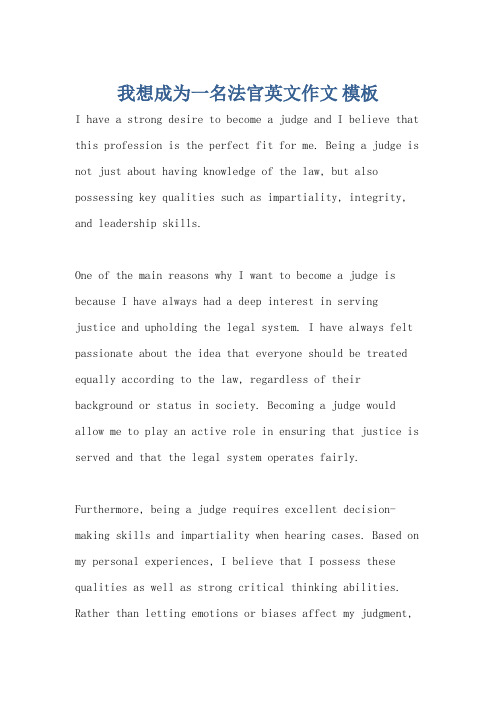
我想成为一名法官英文作文模板I have a strong desire to become a judge and I believe that this profession is the perfect fit for me. Being a judge is not just about having knowledge of the law, but also possessing key qualities such as impartiality, integrity, and leadership skills.One of the main reasons why I want to become a judge is because I have always had a deep interest in servingjustice and upholding the legal system. I have always felt passionate about the idea that everyone should be treated equally according to the law, regardless of their background or status in society. Becoming a judge would allow me to play an active role in ensuring that justice is served and that the legal system operates fairly.Furthermore, being a judge requires excellent decision-making skills and impartiality when hearing cases. Based on my personal experiences, I believe that I possess these qualities as well as strong critical thinking abilities. Rather than letting emotions or biases affect my judgment,I can effectively evaluate evidence presented before me in order to make fair and rational decisions.Communication skills are another essential trait for any aspiring judge. Judges must be able to interact with people from all walks of life – lawyers, witnesses, jurors and litigants – with tactfulness and clarity. As someone who has previously worked in customer service roles, I am confident in my ability to communicate effectively with people from different backgrounds while maintaining objectivity.Finally, becoming a judge means taking on significant amounts of responsibility while maintaining high standards of integrity. This responsibility demands one's utmost dedication to their profession -- not only for upholding justice but also for enriching oneself with new knowledge about legal proceedings.In summary, becoming a judge is both an honorableaspiration and challenging pursuit. It demands extensive training along with great personal qualities likeimpartiality and communication skills. Nonetheless, given my passion towards this field combined with my ability to think critically and clearly communicate ideas --- these qualities truly represent what it takes to become an accomplished judicial professional!。
追求正义的英文作文

追求正义的英文作文英文:Pursuing justice has always been a passion of mine. I believe that it is important to stand up for what is right and fight against injustice. In my opinion, justice is not just a concept, but a way of life that we should all strive for.One of the reasons why I am so passionate about pursuing justice is because I have seen firsthand the negative effects of injustice. For example, I have a friend who was wrongfully accused of a crime and spent years in prison. It was only after years of fighting for his innocence that he was finally released. This experience opened my eyes to the flaws in our justice system and the importance of fighting for justice.Another reason why I am passionate about pursuing justice is because I believe that it is our duty as humanbeings to help those who are less fortunate. There are many people in the world who are victims of injustice and do not have the resources or the means to fight for their rights. It is our responsibility to stand up for these individuals and fight for justice on their behalf.In order to pursue justice, it is important to have a strong sense of determination and perseverance. It is not always easy to fight against injustice, but it is important to never give up. I have learned that even small actions can make a big difference. For example, volunteering at a local organization that fights for justice or speaking out against injustice on social media can have a big impact.In conclusion, pursuing justice is a noble and important pursuit. It is our duty as human beings to fight against injustice and stand up for what is right. With determination and perseverance, we can make a difference in the world and help those who are in need.中文:追求正义一直是我的热情所在。
写孔子的作文英语

写孔子的作文英语Confucius born in 551 BC and passing away in 479 BC is one of the most influential figures in Chinese history. His teachings known as Confucianism have shaped Chinese society politics and culture for over two millennia. In this essay we will explore the life of Confucius his philosophical ideas and the impact of his teachings on the world.Early Life and EducationConfucius was born in the state of Lu which is presentday Shandong Province in China. His birth name was Kong Qiu and he later became known as Kong Fuzi meaning Master Kong. Despite his noble lineage Confuciuss family was not wealthy and he had to work from a young age to support himself. His early experiences of hardship instilled in him a deep sense of empathy and a commitment to social justice.Philosophical IdeasConfuciuss philosophy is centered around the concept of Ren 仁 which can be translated as benevolence or humaneness. He believed that individuals should cultivate moral virtue and strive to be good citizens. Key tenets of his philosophy include1. Filial Piety 孝 Confucius emphasized the importance of respecting and caring for ones parents and elders. This principle extends to all relationships advocating for a harmonious and respectful society.2. The Doctrine of the Mean 中庸 He advocated for moderation in all things suggesting that balance is essential for personal and societal wellbeing.3. The Five Constants 五常 These are benevolence righteousness propriety wisdom and faithfulness. Confucius believed that these virtues should guide personal conduct and governance.4. The Importance of Ritual 礼 Rituals and ceremonies play a crucial role in Confucian thought serving as a means to express respect and maintain social order.Education and GovernanceConfucius was a proponent of education for all regardless of social status. He believed that education was the key to personal development and the betterment of society. As ateacher he attracted many disciples who later spread his teachings throughout China.In terms of governance Confucius advocated for rulers who were virtuous and led by example. He believed that a rulers moral conduct would naturally lead to a wellordered and harmonious state.Legacy and InfluenceConfuciuss teachings have had a profound impact on East Asia particularly in China Korea Japan and Vietnam. His ideas have influenced everything from family relationships and social hierarchy to education systems and political thought.The Analects 论语 a collection of sayings and ideas attributed to Confucius and his disciples is one of the most important texts in Confucianism. It continues to be studied and revered for its wisdom and insight into human nature and society.In modern times Confucianism has experienced a revival with people looking to the teachings of Confucius for guidance on ethics governance and social harmony. His emphasis on moral development and social responsibility remains relevant in todays complex and interconnected world.In conclusion Confucius was more than a philosopher he was a teacher a statesman and a visionary whose ideas continue to resonate and guide millions. His emphasis on virtue education and the importance of relationships has left an indelible mark on human civilization making him one of the most significant cultural icons in history.。
富兰克林13条美德中英文
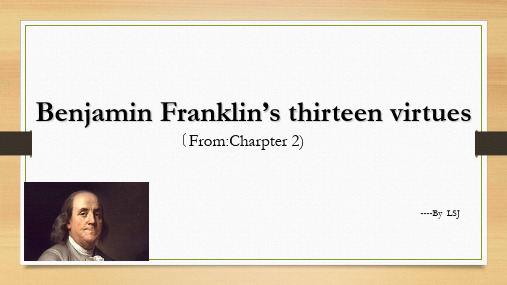
Benjamin Franklin’s thirteen virtues
Thank you
versation.
• • 。沉默:言必有益,防止闲聊〔只说那些能让他人或自己受益的话。
防止闲聊。)
Benjamin Franklin’s thirteen virtues
•3. Order
• Order: Let all your things have their places. Let each part of your business have its time.
Justice
Moderation Cleanliness Chastity Tranqulity Humility
Benjamin Franklin’s thirteen virtues
• 1、 Temperance
• Temperance: Eat not to dullness and drink not to elevation
成功解决)
•
Benjamin Franklin’s thirteen virtues
• 5、Frugality:
• Frugality:Make no expense but to do good to others or yourself:
i.
e. Waste nothing.
•
• 节省:当花费才花费,不可浪费(只花对他人或自己有益处的钱,就
habitation.
• 整洁:衣着整洁,居室干净〔不可容忍身体、衣服和住所的污秽〕
Benjamin Franklin’s thirteen virtues
• 11、 Chastity:
• Chastity:Rarely use enery but for health or offspring; Never to
